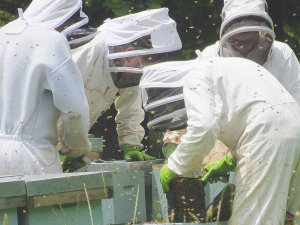Beekeepers in parts of the country badly hit by Cyclone Gabrielle and other storms are still struggling to get access to their hives.
ApicultureNZ chief executive Karin Kos told Rural News the problem is mainly in isolated locations in Hawke's Bay, Tairawhiti and Northland. It's estimated that up to 8,000 hives could have been lost in the cyclone and Kos says there will be a significant cost to beekeepers to replace these hives and their queens.
But the biggest problem for beekeepers is simply getting access to their hives on farms. Kos says it's a combination of washed out roads and bridges and tracks on farms.
"One beekeeper I spoke to says it took them four days to get to their hives," she told Rural News.
Kos says apiarists need to get to their hives now to prepare them for winter. She says they need to treat the hives for varroa mite and also make sure the bees have sufficient food available to get them through winter.
"For the hives that have been lost due to floods, there is a need to dispose of these to prevent the spread of disease."
Kos says government has just come to the party to help beekeepers by setting up a $250,000 fund to specifically minimise the escalation of disease in hives that have been affected by Cyclone Gabrielle. She says this money will be used to hire equipment, fund additional wages and generally aid the recovery.
While some concern has been expressed about whether there will be sufficient bees for pollination in the coming year, Kos believes the nature of this problem is still an unknown. She points out that while hives have been lost, so have orchards and also notes that many beekeepers have not been affected by the storms.
The yield in the North Island is down and said to be worse than last year with cold wet conditions and a lack of flowers being the big contributors. Conversely it's been a better year in the South Island with a bumper crop of clover honey being produced.











